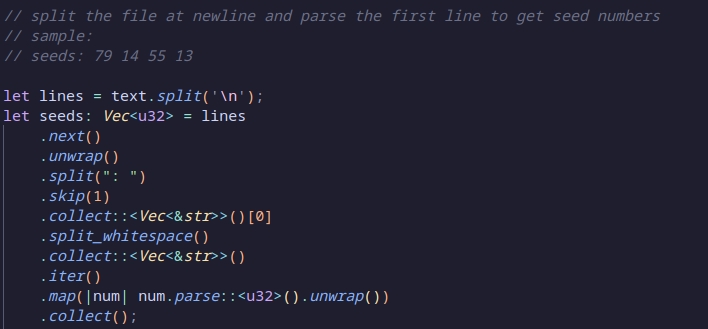
The
collect’s in the middle aren’t necessary, neither is splitting by": ". Here’s a simpler versionfn main() { let text = "seeds: 79 14 55 13\nwhatever"; let seeds: Vec<_> = text .lines() .next() .unwrap() .split_whitespace() .skip(1) .map(|x| x.parse::<u32>().unwrap()) .collect(); println!("seeds: {:?}", seeds); }It is simpler to bang out a
[int(num) for num in text.splitlines()[0].split(' ')[1:]]in Python, but that just shows the happy path with no error handling, and does a bunch of allocations that the Rust version doesn’t. You can also get slightly fancier in the Rust version by collecting into aResultfor more succinct error handling if you’d like.EDIT: Here’s also a version using
anyhowfor error handling, and the aforementionedResultcollecting:use anyhow::{anyhow, Result}; fn main() -> Result<()> { let text = "seeds: 79 14 55 13\nwhatever"; let seeds: Vec<u32> = text .lines() .next() .ok_or(anyhow!("No first line!"))? .split_whitespace() .skip(1) .map(str::parse) .collect::<Result<_, _>>()?; println!("seeds: {:?}", seeds); Ok(()) }Yeah I was trying to do something like reading the first line by getting an iterator and just looping through the other lines normally, since first line was kind of a special case but it got messy quick. I realized halfway that my collects were redundant but couldn’t really simplify it. Thanks
Also,
anyhow::Contextprovides a convenient way to turnOption<T>andResult<T, Into<anyhow::Error>>intoanyhow::Result<T>Like this:
use anyhow::Context; // to my understanding it's better to // specify the types when their names // are the same as in prelude to improve // readability and reduce name clashing fn main() -> anyhow::Result<()> { let text = "seeds: 79 14 55 13\nwhatever"; let seeds: Vec<u32> = text .lines() .next() .context("No first line!")? // This line has changed .split_whitespace() .skip(1) .map(str::parse) .collect::<Result<_, _>>()?; println!("seeds: {:?}", seeds); Ok(()) }Edit: line breaks
You can’t really blame that on rust.
Yeah ngl it’s very ugly. But hey as long as it works it’s not stupid amirite?
Rust borrows a lot of it’s design from functional programming languages like Haskell, which has its good and bad. You could also choose to implement this behavior iteratively like typical C programs, but that tends to be ugly in other ways.
Personally, I’ve grown fond of the functional style. You see it in other places too, like the higher order functions in JavaScript. What’s good about them in Rust is you still get amazing performance due to zero-cost abstraction. Trying to implement it yourself would likely be slower, so use them any chance you get.
Show the alternative, I’ll have a good laugh.
It’s Nim, but I have no idea why you can’t do this in Rust:
var seeds = lines[0].split(": ")[1].splitWhitespace().mapIt(it.parseInt)Full solution: https://codeberg.org/Archargelod/aoc23-nim/src/branch/master/day_05/solution.nim
Ahh, it is the same thing. Rust example surely has some cruft, but mostly for the better. I’m sure not all of it is needed.
Java 2. World is full of wonders
Java 2 didn’t have streams nor iterator combinatorics, not sure what you mean?
i didn’t mean as a version. I meant as overuse of streams
How would you have preferred to solve it? Using for loops?
Python style iterator comprehension
(wonder if someone has made that into a macro. if no one has I will)
I don’t think it would be readable. Too much going on. You’d need an outer iter over lines, an inner over words, a check for number and a conversion. And there would be zero error handling.
No less readable than half the Python comprehensions I’ve written.
zero error handling.
Not necessarily. The macro could look for a ? at the end of the final expression (the bit that comes first in a comprehension) and return a Result.
Right, of course, I meant no error handling in the Python impl





